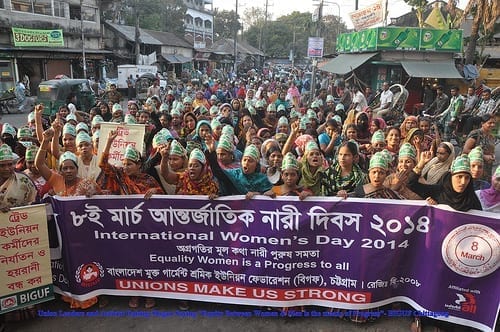
Apr 18, 2014
Garment workers continue to be fired and harassed at the Taratex BD Ltd. factory in Gazipur, Bangladesh, according to the Bangladesh Independent Garment Workers Union Federation (BIGUF). More than 100 workers have been fired since they filed for union registration at the factory on February 4.
On Sunday, BIGUF says factory managers detained the new union president and general secretary and pressured them to immediately resign from their positions in the factory by signing previously prepared documents. They signed the documents after they were reportedly threatened, and were then removed from the factory.
The two leaders were elected after the factory terminated the union’s 12 executive committee members in the lead up to the union being registered on April 4. Six union members told BIGUF they have been forced to leave their homes for fear of their personal safety.
BIGUF is working with the factory union to file an unfair labor practice in addition to the one it filed in February 24. The federation says it remains “deeply concerned about the ongoing pattern of anti-union retaliation and mass terminations at Taratex.”
BIGUF is calling for immediate reinstatement and back pay for all workers who have been fired. Further, BIGUF says, authorities must send a clear message that terminations and other forms of anti-union intimidation are unacceptable, will not be tolerated and will be fully prosecuted in accordance with the law.
Mar 11, 2014
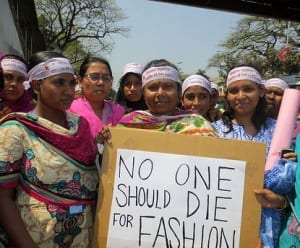
In Bangladesh, BCWS Executive Director Kalpona Akter rallied with garment workers on International Women Day. Credit: Solidarity Center
Hundreds of workers from multiple garment factories rallied in recent days at the National Press Club in Dhaka, Bangladesh, where they formed a human chain and demanded equal wages, equal rights and equal dignity for woman workers in the ready-made-garment (RMG) sector. The action was among many around the world throughout the past week as women workers and their allies commemorated International Women’s Day, held annually on March 8.
In Chittagong, where workers from 16 garment factories marched and rallied, Bangladesh Independent Garment Union Federation (BIGUF) Chittagong President Nomita pointed out that nearly all who took part were women.
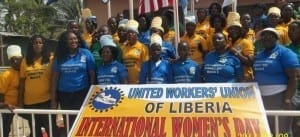
Liberian trade unionists celebrate International Women’s Day 2014. Credit: Solidarity Center
“I can’t imagine trade unions without women,” she said. Nomita urged RMG factory owners to fully implement maternity leave and establish child care centers in factories. In addition to BIGUF, other Solidarity Center allies taking part in International Women’s Day actions in the country included the Bangladesh Center for Worker Solidarity (BCWS), the Bangladesh National Garments Workers Employees League (BNGWEL), the National Garment Workers Federation (NGWF) and Sommilito Garments Sramik Federation (SGSF).
Elsewhere around the world, Solidarity Center allies marked International Women’s Day by celebrating, educating and mobilizing.
• In Tunisia, the Union Générale Tunisienne du Travail (UGTT) held a solidarity march for Palestinian women and repressed women around the world. The March 8 event took place on the main avenue in Tunis, the capital, and concluded at the UGTT center with music, cultural activities, poetry and an exhibit on the history of women’s activism in Tunisia. The event followed a roundtable on a comparative study of women’s rights in the country’s three constitutions.
• Moroccan union activists and members of the Confederation Democratique du Travail (Democratic Labor Confederation, CDT), took part in trainings that covered women’s legal rights and they also held artistic and cultural events, concluding with a ceremony honoring social activists and retired women. The Union Marocaine du Travail (Moroccan Workers’ Union, UMT) combined a celebration of Women’s Day with events marking the 59th anniversary of its founding congress. Later this month, UMT will host a roundtable discussion on the role of women in the union and strategies for broadening women’s participation in the union.
• The Border Committee of Women Workers (Comité Fronterizo de Obreras, CFO) held a mini-workshop for women participating in the Solidarity Center’s Gender and Women’s Empowerment for Action program in Coahuila, Mexico. The discussion focused on how International Women’s Day is more than a time for women to receive feel-good gestures like a flower or nice words on Facebook from the men in their lives. In Mexico, where women disproportionately bear the brunt of the country’s economic and social insecurity and violence, Women’s Day offers a space for women and girls to evaluate how far they’ve come and how much further they still must go to win equality with men and boys and achieve justice in all areas of their lives.
In Liberia, women and their allies held a parade to the United Workers Union of Liberia (UWUL) office, where they raised flags in recognition of labor partner organizations such as the United Steelworkers and IndustriAll that implement programs to help female unionists to become a strong force in Liberia.
• Across South Africa, the Solidarity Center joined with Labour for Rights for Women (LRW) campaign and the Labour Research Service (LRS) to host two events. In North West Province, the organizations convened health care workers, farm workers and domestic workers in a meeting with local civil society organizations and the South African Department of Health to discuss the impact of a new government health insurance plan, especially its impact on women workers. In Limpopo Province, the LRW held a training session for union gender coordinators, organizers and negotiators on maternity protection. The LRW, sponsored by the International Trade Union Confederation (ITUC), brings together South Africa’s labor federations to support improved respect for women’s rights at the workplace and their greater participation in union activities
Mar 6, 2014
Workers at the Taratex BD Ltd. garment factory in Bangladesh have been targets of violence and mass firings, according to the Bangladesh Independent Garment Workers Union Federation (BIGUF).
The workers filed for union registration at the factory in Gazipur, outside of the capital, Dhaka, on February 4, 2014. Since then, they say they have since endured a fierce anti-union campaign by management. A reported 86 union supporters at the factory have been fired, including 12 members of the union’s factory-level executive committee.
Many of these workers told BIGUF they have been verbally or physically assaulted and asked to sign papers of an unknown nature. Factory workers who support the union also report being visited at their homes and threatened.
On February 22, union vice president Farahad and union supporters Sohel and Mostak told BIGUF they were detained and physically assaulted as they attempted to enter the factory. They said police refused to accept their crime reports or pursue the incident. Six union members told BIGUF they have been forced to leave their homes for fear of their personal safety.
BIGUF filed an unfair labor practice on February 24 and contacted the Bangladesh Garment Manufacturers and Exporters Association (BGMEA) for assistance in resolving the issue. BGMEA, the trade association representing Bangladesh export manufacturers, has not yet responded.
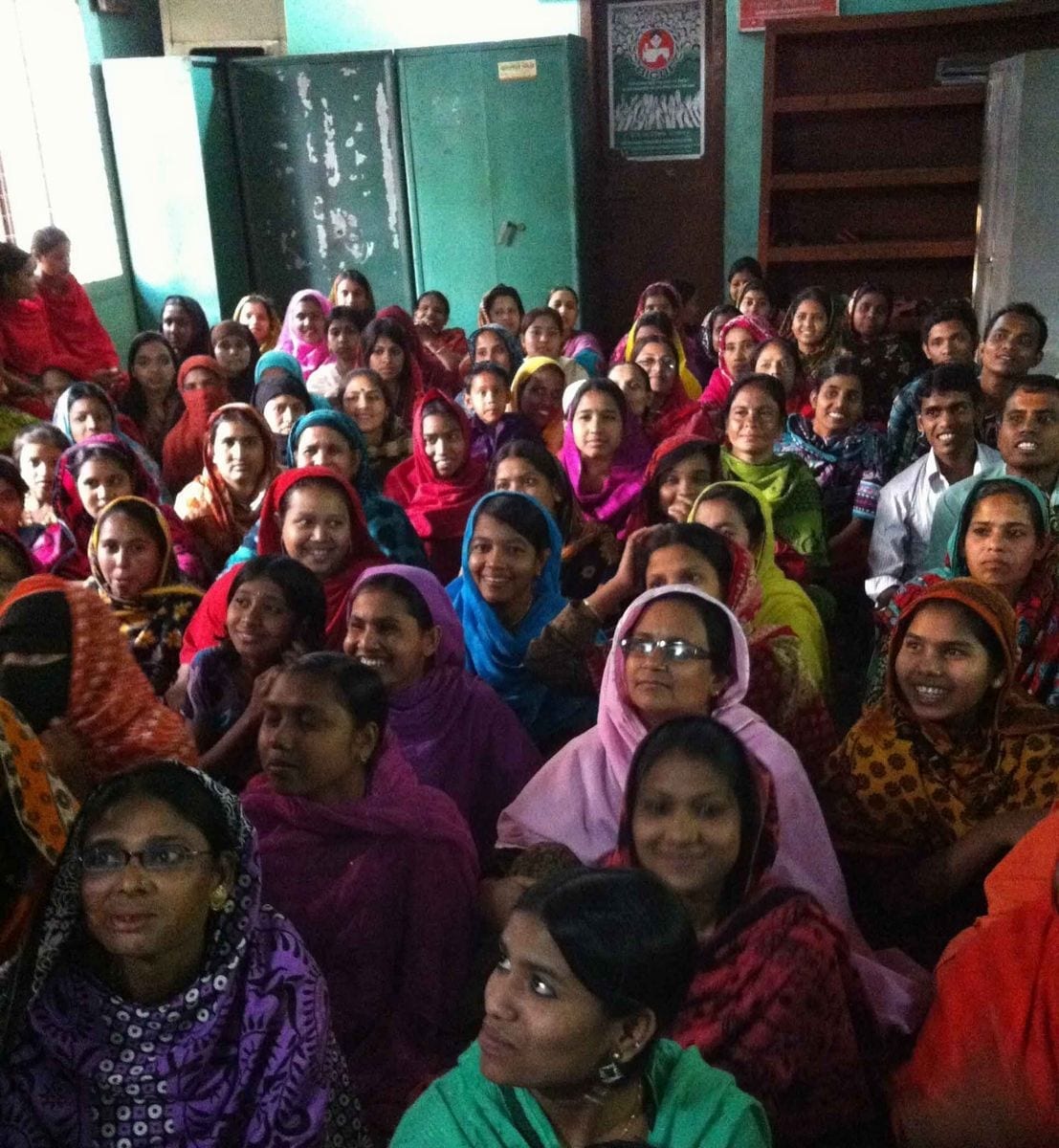
Mar 5, 2014
More than 400 Bangladesh garment workers and trade unionists rallied over the weekend at the National Press Club in Dhaka, the capital, to demand police take action to find perpetrators who beat and badly injured a garment worker leader and four union organizers last week. The group was talking with garment workers when they were attacked, and police subsequently refused to accept a report on the incident.
After rallying at the Press Club, union activists and their allies marched to the Ministry of Home Affairs, where staff received a small delegation of activists and accepted their letter calling for government officials to pursue justice for the victims. Later that night, police accepted the crime report from the victims of the violent attack, the prelude to beginning an investigation.
Participants in the rally and march include members and leaders of the Bangladesh Federation of Workers Solidarity (BFWS), where the injured organizers work, the Bangladesh Garments and Industrial Workers Federation (BIGUF), the Sommilito Garments Sromik Federation (SGSF), Bangladesh Garments and Industrial Sramik Federation (BGIWF) and the National Garment Workers Federation (NGWF).
The factory, which had been closed following a workers’ protest against the business not paying the minimum wage on February 18, was fully reopened on March 2. Some 30 workers now say they have been verbally terminated.
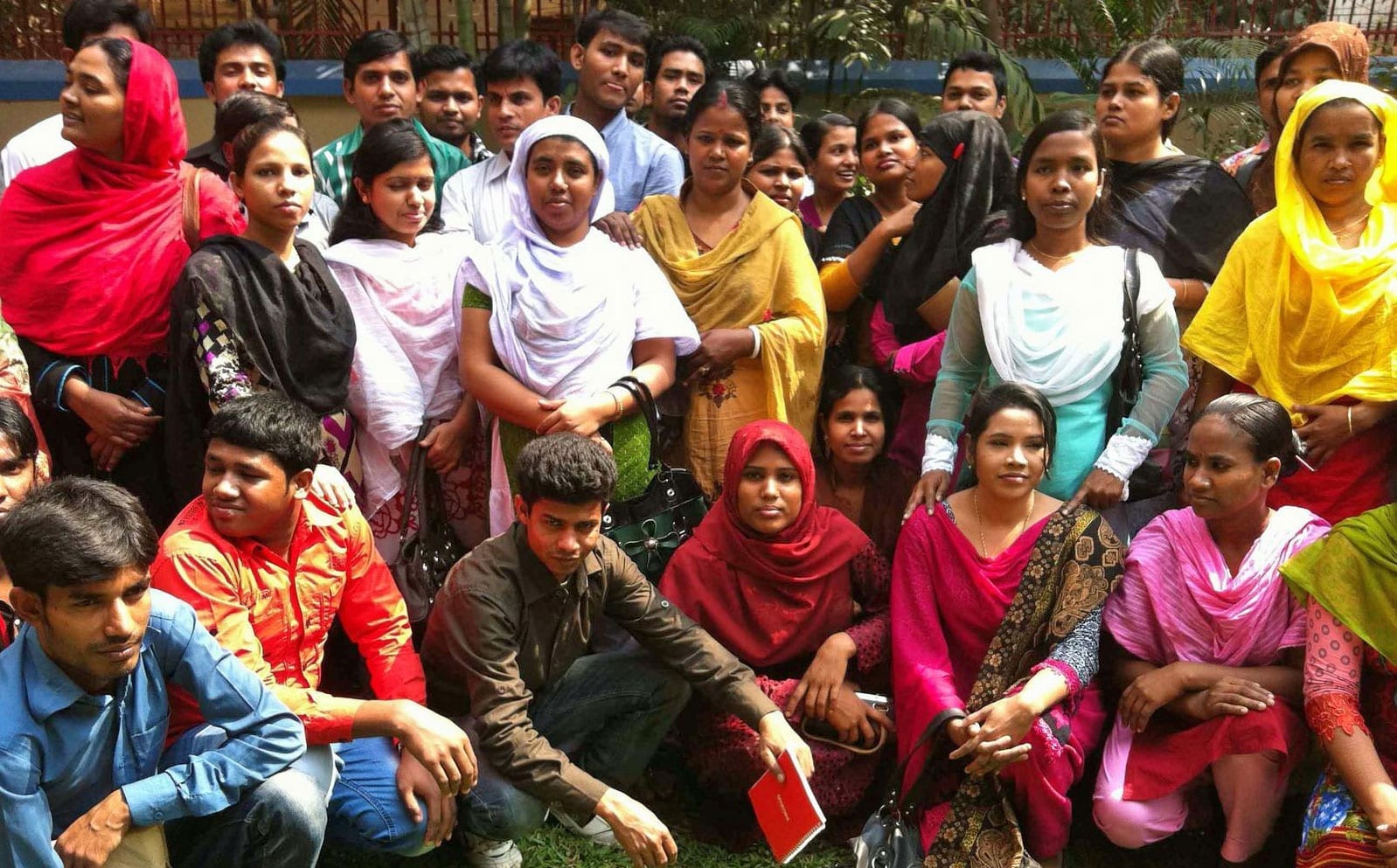
Feb 25, 2014
A Bangladesh garment worker leader and four union organizers, among them two women, were badly injured Saturday when about two dozen people beat, kicked and threw them to the ground as the five were speaking to workers in the dormitory where they live. One of the organizers was taken from the scene, beaten severely and dumped, unconscious, nearby. He and a female organizer remain in the hospital. The whereabouts of the garment worker are unknown.
According to several witnesses, the attack was carried out by factory managers and other men and women, some of them who worked for the factory, potentially paid to carry out the act—not an uncommon practice in the country. The women in the group were separated from the others and threatened with rape.
The organizers, all working with the Bangladesh Federation of Workers Solidarity, were supporting workers who had earlier approached the union for assistance and who had been fighting to be paid the minimum wage at their factory. The factory, which manufactures for Western brands, employs approximately 4,500 workers—many of who had staged a wage protest February 18, which was ultimately put down by police.
On Saturday, the organizers and activists from the factory floor signed up about 300 workers for a union before the attack occurred—though all the signed authorization cards were stolen during the assault.
Workers, activists and the Solidarity Center are calling for a thorough and vigorous investigation into the crime that brings the perpetrators to justice and shows that Bangladesh is unwilling to tolerate attacks on workers’ right to freedom of association.
The Solidarity Center is providing legal assistance and support for medical expenses for the injured organizers, and partners with the Bangladesh Federation of Workers Solidarity.





